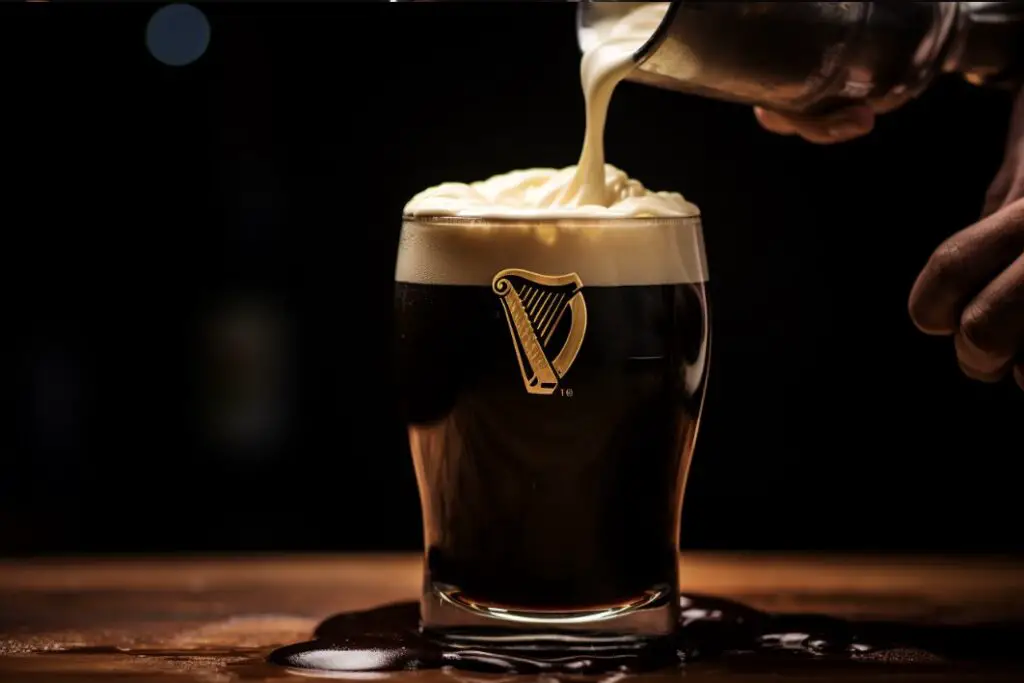Does Guinness beer go bad? The short answer is yes, Guinness beer can go bad, just like any other type of beer.
However, it’s important to understand the factors that contribute to beer spoilage and the signs of a bad beer.
In this blog post, we’ll explore the shelf life of Guinness, the factors that can affect its quality, how to store it properly, and how to tell if your Guinness beer has gone bad. So grab a pint and let’s dive into the world of this iconic Irish stout!
Shelf Life of Guinness
Guinness beer typically has a shelf life of around six months from the bottling or canning date when stored properly. This is because the beer is pasteurized during the brewing process, which helps to extend its longevity.

However, the shelf life can be shortened if the beer is exposed to heat, light, or oxygen, so it’s essential to store it in a cool and dark place.
Draft vs. Bottled vs. Canned Guinness
The type of packaging can also affect the shelf life of Guinness beer. Draft Guinness, served straight from the keg, is generally considered to be the freshest and most flavorful as it has not been exposed to air during packaging. However, it should be consumed within a few days of opening the keg to maintain its quality.
Bottled Guinness has a slightly longer shelf life than draft because it is sealed in a glass container, which provides some protection against light and oxygen exposure. However, bottled beer can still be affected by temperature fluctuations and light exposure, so it’s important to store it properly.
Canned Guinness is the most resilient to spoilage since the aluminum can provides a complete barrier against light and oxygen. This makes canned Guinness the best option for long-term storage and transportation. However, it’s still important to store canned beer in a cool and dark environment to maintain its freshness.
Factors Affecting the Quality of Guinness Beer
There are several factors that can affect the quality and freshness of Guinness beer, including:
1. Temperature: Beer should be stored at a consistent temperature between 45°F and 55°F (7°C and 13°C). Fluctuating temperatures can cause the beer to spoil faster.
2. Light: Exposure to light, especially sunlight, can cause beer to develop a skunky flavor. This is because the UV rays in sunlight break down the hop compounds in the beer, creating an unpleasant taste.
3. Oxygen: Beer is sensitive to oxygen, which can cause it to oxidize and develop stale flavors. This is why it’s essential to keep beer containers sealed until you’re ready to drink them.
4. Age: As mentioned earlier, Guinness beer has a shelf life of around six months. Drinking the beer beyond this time frame can result in a decline in quality and flavor.
How to Store Guinness Beer Properly
To ensure your Guinness beer stays fresh and maintains its quality, follow these storage tips:
1. Keep it cool: Store your beer in a cool environment, ideally between 45°F and 55°F (7°C and 13°C). A dedicated beer fridge or a cool, dark cellar is ideal.
2. Protect it from light: Keep your beer away from sunlight and other sources of UV light to prevent it from developing a skunky flavor.
3. Store bottles upright: Storing beer bottles on their side can increase the surface area exposed to oxygen, leading to faster oxidation. Keep bottles upright to minimize oxygen exposure.
4. Keep it sealed: Don’t open your beer until you’re ready to drink it, as exposure to oxygen will cause it to spoil faster.
Signs That Your Guinness Beer Has Gone Bad
If you’re unsure whether your Guinness beer is still good to drink, look out for these signs of spoilage:
1. Unpleasant smell: A bad beer will often have a sour, skunky, or musty smell.
2. Off taste: If your Guinness beer tastes stale, sour, or overly bitter, it’s likely past its prime.
3. Flatness: A lack of carbonation can indicate that a beer has gone bad, as the CO2 has escaped due to a compromised seal or prolonged exposure to oxygen.
4. Murky appearance: If your beer looks cloudy or has visible particles floating in it, it may have spoiled.
The Impact of Drinking Bad Guinness Beer
Drinking a bad Guinness beer is unlikely to cause any serious health issues. However, it can result in an unpleasant taste and may lead to temporary gastrointestinal discomfort. It’s best to err on the side of caution and discard any beer that shows signs of spoilage.
Conclusion
In summary, Guinness beer can go bad, but proper storage and timely consumption can help maintain its quality and freshness. Be sure to store your beer in a cool, dark environment and consume it within six months of the bottling or canning date. If you notice any signs of spoilage, it’s best to discard the beer and opt for a fresher pint. Cheers!
10 Quick Facts About Guinness Beer and Spoilage
1. Guinness beer has a shelf life of around six months from the bottling or canning date.
2. Draft Guinness is the freshest but should be consumed within a few days of opening the keg.
3. Bottled and canned Guinness have a longer shelf life but should still be stored properly.
4. Factors affecting Guinness beer quality include temperature, light, oxygen, and age.
5. Ideal storage temperature for beer is between 45°F and 55°F (7°C and 13°C).
6. Exposure to sunlight can cause beer to develop a skunky flavor.
7. Storing beer bottles upright minimizes oxygen exposure and reduces the risk of spoilage.
8. Signs of bad Guinness beer include an unpleasant smell, off taste, flatness, and a murky appearance.
9. Drinking bad beer is unlikely to cause serious health issues but may result in temporary gastrointestinal discomfort.
10. Proper storage and timely consumption can help maintain the quality and freshness of your Guinness beer.
FAQs
What is the shelf life of Guinness beer?
The shelf life of Guinness beer is typically around 9 to 12 months if stored properly. It is important to check the expiration date on the bottle or can for the most accurate information.
Can you drink 20 year old beer?
Technically, you can drink 20-year-old beer, but the taste and quality may have significantly deteriorated over time. Beer is best consumed fresh, as it is a perishable product. Over the years, the flavors can become stale, oxidized, or even spoiled, resulting in an unpleasant drinking experience. It’s unlikely to cause any harm, but don’t expect it to taste as good as when it was first brewed.
Can you drink 2 year old Guinness?
Yes, you can drink 2-year-old Guinness. Guinness has a relatively long shelf life, and if stored properly, it should still be safe to consume. However, the taste and quality may not be as optimal as when it was fresh. It’s always recommended to check for any signs of spoilage, such as unusual odors or flavors, before consuming any expired beverage.
Does Guinness have to be refrigerated?
Guinness does not necessarily have to be refrigerated, but it is recommended to store it in a cool place. Refrigeration can help preserve the quality and taste of the beer, especially if it is opened. However, if the unopened Guinness is stored in a cool and dark place, it can remain good for an extended period.
Does unopened beer go bad?
No, unopened beer does not go bad in the sense of spoiling or becoming unsafe to consume. However, its taste and quality may deteriorate over time due to oxidation and exposure to light. The flavor profile of beer is best when consumed fresh.
Can you drink Guinness a year out of date?
It is generally safe to consume Guinness that is a year past its expiration date, as long as it has been stored properly. However, the flavor and quality may have deteriorated over time. It is recommended to check for any signs of spoilage, such as off-putting odors or unusual appearance, before consuming.




